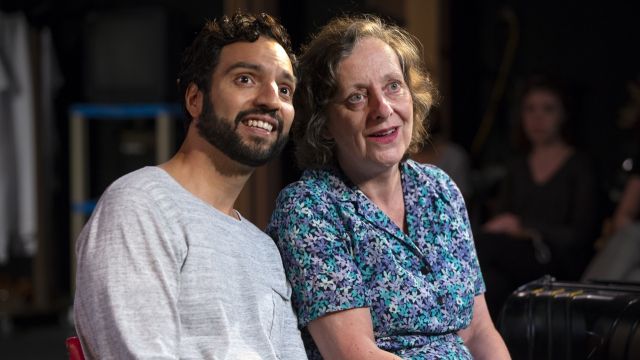Once in Royal David's City
Michael Gow tells his stories via believable characters and tight dialogue, especially when the messages are just a little bit angry, just a little bit critical, just a little bit emotional. Through his young protagonist, Will Drummond, Gow uses the theatre to raise issues that affect us all – inequality, exploitation, illness, loss. And in true political theatre style, he uses real situations and vulnerable characters who reach past the stage to tell us that “the war might be endless, and it’s probably already lost but that’s not a reason to give up”.
What better place to stage a play such as this than the New? With its slogans, Art is a Weapon and Theatre with a Purpose, the New was the original home of the ‘radical’ theatre set of the 1930s and 40s. It introduced things such as ‘agitprop’, revue sketches, acting classes and play writing competitions. It promoted women playwrights such as Betty Roland, Mona Brand and Katherine Sussanah Pritchard.
Look up its history. It makes interesting reading.
 Director Patrick Howard accepts Gow’s only suggestion as to the set – namely “The Play takes place in a theatre” – and peels the stage back to bare walls lined with props, which the twelve cast members, who are on stage for the whole play, move appropriately as the scenes demand. Lighting designer Viktor Kalka skilfully highlights each segment of the action, taking the players from airport, to beach, to theatre, to hospital, and accentuating the poignancy of each moment.
Director Patrick Howard accepts Gow’s only suggestion as to the set – namely “The Play takes place in a theatre” – and peels the stage back to bare walls lined with props, which the twelve cast members, who are on stage for the whole play, move appropriately as the scenes demand. Lighting designer Viktor Kalka skilfully highlights each segment of the action, taking the players from airport, to beach, to theatre, to hospital, and accentuating the poignancy of each moment.
This is a very moving play and much of the continuity rests on the shoulders of Will, played here with uncanny realism by Francisco Lopez. With his first words, “Welcome. Thanks for coming. I’m in an airport.”, Lopez breaks through the fourth wall, takes the audience into his story and establishes a personality that he sustains for the whole play. Will is an intellectual, and a theatre director, but events in his life have left him perplexed and angry, and he wants to explain why. So, via his family, he takes you back in time to show you how he has come to this particular Christmas
Firstly, there is his mother, Jeannie, played with intense conviction by Alice Livingstone, who takes the audience back to the summer weekend where Will was lost at the beach – and explains how this has made her particularly protective of him.
Jeannie and Will then sit with Will’s father, Bill, as he faces speech therapy after a stroke. In this scene Livingstone finds another dimension of Jeannie as she rages against the employer that fired him, with just a month’s wages, and the devastating effect this has had upon him. “Everything’s taken off you in the end,” she says, but clings steadily to her belief in Will.
 Martin Portus, who plays Bill, finds all the frustrating confusion of a stroke victim. He sits, wound up, upset, desperate to remember sounds and words, then becoming more and more agitated as the story of his redundancy is retold. Portus doubles later in the play as Wally, a charming but persistent religious hospital visitor.
Martin Portus, who plays Bill, finds all the frustrating confusion of a stroke victim. He sits, wound up, upset, desperate to remember sounds and words, then becoming more and more agitated as the story of his redundancy is retold. Portus doubles later in the play as Wally, a charming but persistent religious hospital visitor.
Then we are back in the present, at the airport in Ballina, where he’s planned a wonderful Christmas for his mother. She arrives – but is not well – and things do not go as he planned.
Gow has used many political theatre techniques in this play – humour, song, direct appeal – to take the audience with Will as he faces the various stages of grieving and finds the strength to keep believing “that there might be a speck of justice in an insane world”, despite his life and what he learns from other members of the ensemble as they take on a variety of roles.
Amy Victoria Brooks, Natalie Fenwick, Sandra Campbell, Bryden White-Tuohey, Angela Johnston, Nicholas Foustellis and Ben Brighton with Alana Birtles and Aimee Lodge become actors, a drama teacher, German tourists – all pertinent to Will’s story. All move into their different characters with the precision and energy of the tight ensemble that Howard has developed. Foustellis is particularly moving in the role of the young doctor who has to explain a hopeless diagnosis.

Gow – and Howard – manage to find some humour in the philosophies that underwrite this play. It softens the pathos a little, but takes nothing away from the social and political themes.
Will’s explanation to a drama class of the still relevant messages of Brecht’s Mother Courage and The Caucasian Chalk Circle, make Gow’s point about the need to keep fighting against contemporary oppression, but it is perhaps the links he makes between Marxism and Christianity in the words of The Internationale and the hymn Once in Royal David’s City – sung so beautifully by the whole cast – that make his point most cleverly:
… For justice thunders condemnation
A better world’s in birth!...
With the poor and meek and lowly …,
… He was little, weak, and helpless,
Tears and smiles like us He knew …
Carol Wimmer
Photographer: Bob Seary
Subscribe to our E-Newsletter, buy our latest print edition or find a Performing Arts book at Book Nook.

